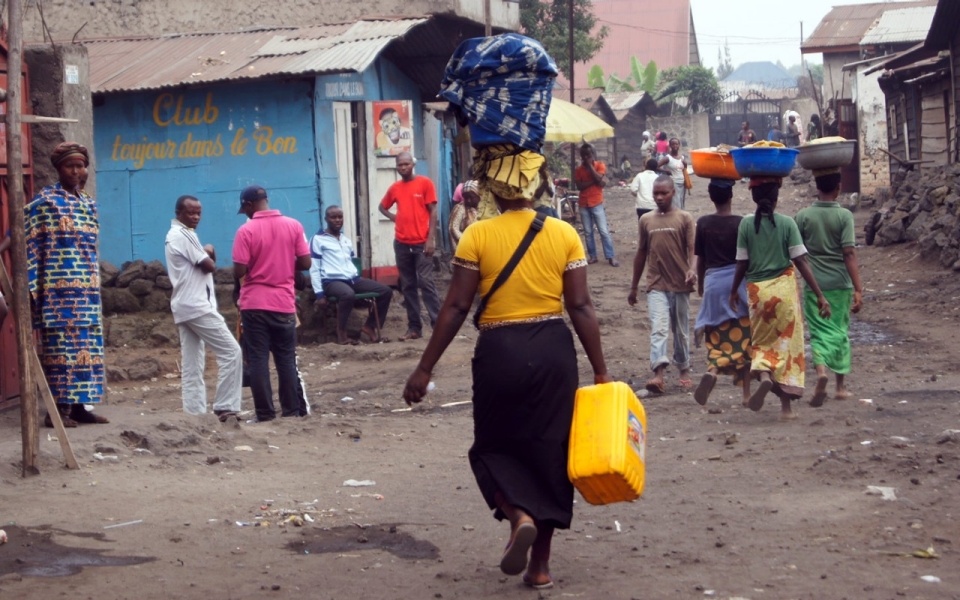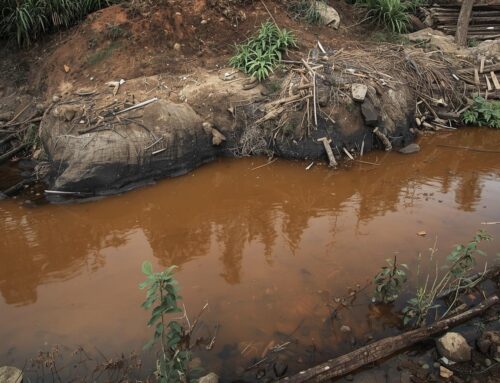GOMA, Democratic Republic of Congo — A ban on plastic bags may have earned Rwanda high praise from the international community, but the country’s failure to account for the people — mostly women — who depend on the bags for their livelihood — has spawned a thriving black market.
Umutoni Magambo, a 28-year-old from the Rwandan town of Gisenyi, near the border with the Democratic Republic of Congo, has smuggled thousands of plastic bags into Rwanda. She began taking her clients the bags, or sachets, along with their traditional requests for powdered milk, boxed tomatoes and vegetable oil — all substantially cheaper in the DRC — shortly after the bags were banned in 2008.
In the Congolese town of Goma, Magambo — who asked that her real name not be used, out of fear of a law enforcement crackdown — would undress in a bathroom and tape hundreds of bags to her arms, legs and torso before putting her dress back on and setting out along one of the many illegal paths across the border.
If she continued her journey all the way to the Rwandan capital, Kigali, some 100 miles away, she could make $10 on $30 worth of bags, or almost a week’s average wages in Rwanda.
But in 2011, Magambo gave up smuggling the bags after a friend was caught and sentenced to six months in the infamous Nyakiriba prison. “With two young children, I couldn’t take the risk,” she said.
Rwanda has ramped up its efforts in recent years to stop the bags, which remain popular among street vendors and market stall owners, from filtering into the country from neighboring DRC, Tanzania, Uganda and Burundi. Police search vehicles and pedestrians at border crossings and along Rwanda’s porous borders for the lucrative contraband, which is easily hidden under clothing.
If caught, smugglers say they are forced to destroy the bags, sometimes with their teeth. Worse, they are detained indefinitely and fined hundreds of dollars, which they have no means of paying. On the Congolese side, they say, beatings are common, and in exchange for sex, officers might allow smugglers to cross the border without paying a bribe.
Magambo, who continues to smuggle canned goods across the border, says she would like to run a market stall but worries she won’t make enough money. “The Rwandan taxes are too high,” she says. “It’s too expensive to work legally.”
Customers who buy the bags from smugglers say the same thing about why they peddle plastic.
“No buyer wants to take home sombé
Rukundo, who also would not reveal her real name, was wary of speaking about the bags, which she buys from smugglers by the hundred and keeps in the wrap of her skirt. “They arrest everyone,” she said. “Smugglers, buyers, traders. We can’t afford to pay the fine, so we just have to wait until they let us out, sometimes days later.” A few stalls down, a woman selling flour initially said she didn’t have any plastic bags but eventually offered one.
In Kigali, where the bags fetch the highest price, the contraband is even more taboo.
Market stall owners claim not to have any, but they know who uses them. Poor street vendors, who have been described by the authorities as undesirables and vagabonds, depend on the bags entirely, since they cannot showcase products in paper bags.
The authorities are intent on cracking down on the informal workers, who pay no taxes and risk tarnishing Kigali’s reputation as the cleanest city in Africa — a designation awarded by U.N. Habitat in 2008.
In October 2015, Human Rights Watch released a report that details the arbitrary detention of street vendors at a “transit center” in a residential suburb of Kigali, where they are reportedly beaten and kept in deplorable conditions.
“Having poor people on the street spoils the positive image that Kigali is a modern, clean, city, attractive to foreign visitors,” said Carina Tertsakian, a senior researcher at the Africa division of Human Rights Watch. “That’s what motivates rounding up these people and chucking them into detention.”
Appearances are crucial in Rwanda, which has fought hard to reinvent itself after the 1994 genocide as Africa’s most prosperous and hopeful state. As a small country with few natural resources, it depends enormously on international aid.
Filip Reyntjens, a Rwanda expert at Belgium’s University of Antwerp who has been barred from the country for criticizing its policies, argues that for the authorities, plastic bags and the people who use them are a nuisance.
“They don’t want rubbish on the street, and they don’t want human ‘garbage’ either,” he said. “Most of the image-consciousness in Rwanda is directly related to how aid dependent the country is.”
In its drive to charm the world, the Rwandan government is bolstered by the overwhelming support of its populace. In December 2015 some 98 percent of Rwandans voted in favor of changes that could allow President Paul Kagame, who has effectively ruled the country since 1994 (initially as the minister of defense, then as president), to remain in power until 2034.
But situations like Magambo’s and Rukundo’s suggest that not everybody is benefiting from his government’s full-steam-ahead approach to modernizing the country.
Despite its reputation as a beacon of progress in a region riddled by instability, Rwanda remains a low-income country, with almost half of the population living below the national poverty line. One in four households live in extreme poverty, and more than 50 percent of children are chronically malnourished.
“The plastic bag ban is typical of many well-intentioned policies introduced by the Rwandan government,” said Tertsakian. “They look good on paper, but they have been imposed in a really draconian way, almost overnight. Often the government doesn’t take into account how these policies will affect particularly poor people.”
Juliet Kabera, the acting director of pollution and environment at the Rwanda Environment Management Authority, admits that poor people — Rwandan and Congolese — will continue to sneak in the bags as long as Rwanda’s neighbors continue to use them.
“Rwanda belongs to a free-trade world, in which countries exist that have not yet banned the bags,” she said. “So people will continue to find ways to sneak them in. As with any good that is banned, demand becomes high. It’s about making money, regardless of nationality.”
Kabera was reluctant to discuss prohibition measures that might be seen as heavy-handed by the international community. She and police representative Celestin Twahirwa said that no arrests have been made in enforcing the bag ban, but those who deal in the bags speak of arrests as commonplace.
The prohibition is part of Rwanda’s ambitious Vision 2020 development plan, which is supposed to ensure that the entire country is middle-income by 2020.
For the Rwandan people, the makeover involves some unlikely concessions. The positive environmental effects of banning plastic bags are undisputed. But any real disadvantages of not wearing any shoes or drinking banana wine with a shared straw seem less obvious.
Reporting for this piece was supported by the International Women’s Media Foundation’s Africa Great Lakes reporting initiative.
Source : http://america.aljazeera.com/articles/2016/2/25/rwanda-plastic-bag-ban.html






Leave A Comment